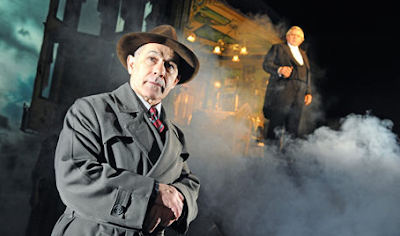
In Birling, Priestly has created a character who tends to dominate the action wherever he can. As the patriarch of a prosperous family, and owner of a factory, Birling’s job is to be in charge.
Within the play, his role is to have his certainties – about the Titanic, Germany*, personal and social responsibility – destroyed. He resists Goole, shifts blame, and is delighted when he thinks it was a hoax. Birling represents those of us who do not want to learn the hard lesson.
Why do this?
2. The Edwardian age was a golden age of Capitalist prosperity, before the war destroyed everything, and it is this complacent mind-set that Priestley wants to criticise. Birling represents a section of society that thought it was indestructible – at the peak of a Capitalist frenzy. Priestley was anxious that the lessons of the mid-century should be learned.
Birling says “it’s a very good time – and soon it’ll be an even better time… of peace and prosperity and rapid progress everywhere“
- He’s wealthy, not aristocratic, unlike his wife. He’s highly conscious of social status. He says he has a “good chance of a knighthood” was “an alderman“, was “Lord Mayor” two years ago, is “on the bench” (i.e. a magistrate), and “plays golf” with “our Chief Constable“.
- He is a self-made man, and personifies capitalism.
“We employers are coming together at last to see that our interests – and the interests of Capital – are properly protected”
“A hardheaded* practical businessman“
*notice the similarity to ‘hard-hearted’. Birling often describes hismself, proudly, as “hard”
“a man has to make his own way“*
*i.e. expect no help from anyone else
- His factory is important in the town. But less important than that of Gerald Croft’s father, of “Crofts Limited“.
- Birling thinks that because he’s successful in business, this puts him in a position to judge what’s correct (Titanic, Germany) – which is why, for him, the arrival of the Inspector is so traumatic.
“…I’m talking as a hard-headed, practical man of
business. And I say there isn’t a chance of war.“
1. he tries to get him on side – with offers of ‘port’, and mention that the Chief Constable is a personal friend – this is almost an attempt at intimidation;
2. he challenges and rejects his authority.
“I don’t like that tone“
“I can’t accept any responsibility. If we were all responsible for everything that happened to everybody … it would be very awkward*, wouldn’t it?”
*note the understatement – ‘awkward’ suggest mere embarrassment. The girl has “died in agony”. This is litotes [dramatic understatement for effect] and is ironic.
3. Birling’s main concern is that his reputation and future social advancement will be damaged. On hearing of the death of Eva Smith, he cannot see that his actions in firing her had any consequences:
“Look – there’s nothing mysterious – or scandalous – about this as far as I’m concerned. Obviously it has nothing to do with the wretched girl’s suicide.“
Birling’s Relationship with Eric
Does Birling learn his lesson?
His first reaction, when the Inspector exits is 1. to blame Eric 2. to say there will be “a public scandal” and complain about his chance of a “knighthood” underlining his essential selfishness, and belief (as Sheila said, critically) that it’s “every man for himself“.
He says “there’s every excuse for what your mother and I did”, “nothing much has happened” though he claims “I’ve learnt plenty tonight“
After the phone calls to the hospital and the police station, which seem to prove Goole is a hoax, Birling becomes [rather excited]. He mocks his son and daughter who have taken the Inspector’s warning about everyone having responsibility for each other seriously:
“the famous younger generation who know it all. And they can’t even take a joke“
